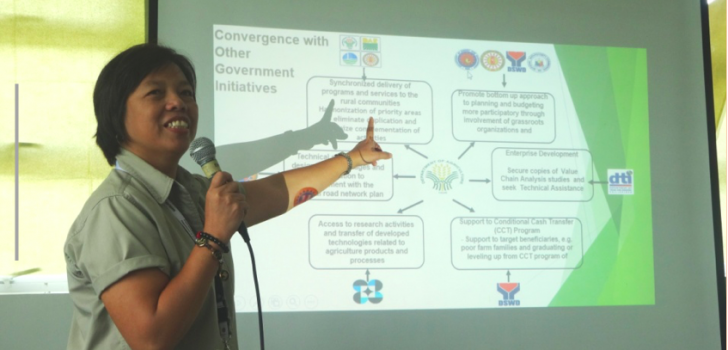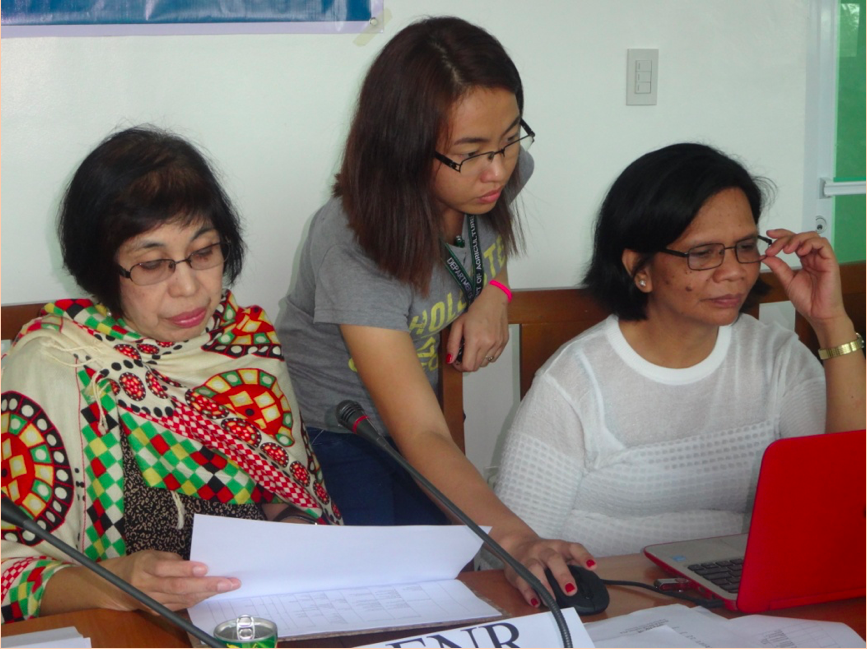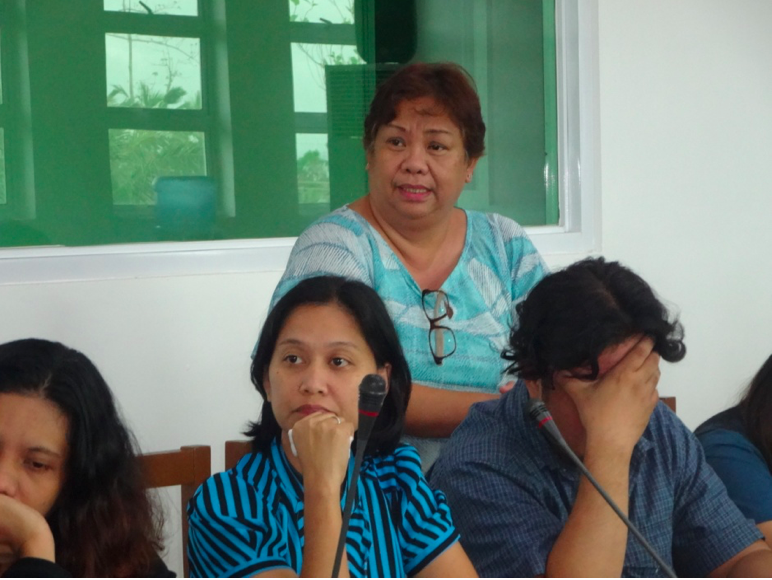 Convergence with DA partner agencies. PRDP Bicol I-PLAN Planning Specialist Mary Ann Cuya discusses the relationship of DA to each of the agencies that are present during the PCIP Planning workshop held at the DA Conference Room, Pili, Camarines Sur. (Photo by: Michelle Angela G. Alfigura, DA-RPCO V InfoACE Unit)
Convergence with DA partner agencies. PRDP Bicol I-PLAN Planning Specialist Mary Ann Cuya discusses the relationship of DA to each of the agencies that are present during the PCIP Planning workshop held at the DA Conference Room, Pili, Camarines Sur. (Photo by: Michelle Angela G. Alfigura, DA-RPCO V InfoACE Unit) PRDP Bicol I-PLAN to start convergence with DA partner agencies
To harmonize the plans and programs of the local government units (LGUs) and the Department of Agriculture (DA) including its partner agencies, the PRDP Bicol local and national level planning (I-PLAN) component conducted the Planning Workshop for the Provincial Commodity Investment Plans (PCIPs).
The said activity aims to solicit the commitment of other agencies in supporting the implementation and operationalization of the PCIPs.
Representatives from the Provincial Project Management and Implementation Unit (PPMIU) of Albay, Camarines Sur, Camarines Norte, Masbate and Catanduanes as well as the City Project Management and Implementation Unit (CPMIU) of Naga City attended the said activity. It was also participated by DA’s partner agencies including the Department of Science and Technology (DOST), Philippine Fiber Industry Development Authority (PhilFIDA), Bureau of Fisheries and Aquatic Resources (BFAR), Department of the interior and Local Government (DILG), Department of Agrarian Reform (DAR), Philippine Crop Insurance Corporation (PCIC), Department of Environment and Natural Resources (DENR), and the Agricultural Training Institute (ATI).
The crafting of the PCIP is based on the value chain analyses (VCAs) of the priority agricultural commodities. The PCIP identifies the development gaps and required interventions for each of the priority commodity. During the Action Planning and Evaluation Workshop of the P/CPMIUs, the participants prepared their accomplishment report for 2016, targets for 2017 and their proposal for 2018 to update the partner agencies about the ongoing interventions for the development of the priority commodities.

PRDP Bicol I-PLAN PDA Marivic Diaz assists the DENR representatives on how to input their data on the worksheet. (Photo by: Michelle Angela G. Alfigura, DA-RPCO V InfoACE Unit)
The DA partner agencies reviewed the PCIPs to identify constraints and raise potential interventions that their agencies can commit. The Bicol Region currently has 11 approved and operational VCAs for abaca, pili, coco geonets, sweet potato, goat, charcoal, coco sugar, cassava, pineapple, crablet and seaweeds.
According to Pat Felizmenio of DOST, they are willing to provide technology trainings for processing seaweeds, coco geonet, pineapple, coco sugar, charcoal briquetting and the latest technology on twining and weaving of abaca and coco geonets.
In addition, the DOST will assist the stakeholders on how to properly package and label their products. The agency will also emphasize the standards on food safety, Good Manufacturing Practices (GMP) and Hazard Analysis and Critical Control Points (HACCP) that will help the promotion of the products through the DOST One Store-One Project.
Ma. Janice Obias of PCIC, on the other hand, said that their agency is ready to provide insurance coverage to commodities such as high value crops (HVC), livestock and fisheries.
DAR Representative Benjar Romero expressed that their agency gives market development promotion and technology trainings for stakeholders.
PhilFIDA Planning Officer Wellington Flores stated that they offer technical support and services for abaca production through the establishment and maintenance of abaca field nurseries and maintenance and upgrading of tissue culture laboratory. The agency also offers extension support, education and training to farmers and other beneficiaries.
Meanwhile, Elizabeth Rose Padilla of DENR mentioned that DENR implements programs on forest protection and conducts trainings that will strengthen the capacity of the Bantay Dagat and other law enforcers in the Marine Protected Areas (MPAs).
Moreover, BFAR’s representative Joelle Benavides said that his agency offers assistance to LGUs in terms of policy formulation or crafting of pertinent municipal fishery ordinances and implementation of fishery laws and regulations. He added that they also provide trainings and technical assistance on culture, processing, marketing and climate change adaptation.
Buenavides also mentioned that BFAR is expanding its seaweed nurseries and it is distributing seaweed farm implements, propagules/cultivars and non-motorized fiberglass-reinforced plastic (FRP) banca. For processing, BFAR provides solar drying facilities, trainings and technical assistance product development and improvement.
Joy Tango of DILG said that she will report to her superiors the need for a policy issuance encouraging the LGUs to support and adopt the PCIP and provide corresponding administrative counterpart in terms of planning and implementation.
Along with the representatives of other agencies, Emmanuel Orogo of ATI explained that

PRDP Bicol I-PLAN Component Head Aloha Gigi Bañaria shares her views during the presentation of the PCIPs. (Photo by: Michelle Angela G. Alfigura, DA-RPCO V InfoACE Unit)
they provide technical assistance and trainings on nursery accreditation and plant materials certification for pili. They also conduct trainings on production and processing and GAP technology for sweet potato, pili and pineapple. In addition, the ATI has hands-on trainings and demonstrations on pili production with start-up kit including seeds for inter-cropping).
ATI also offers technical trainings on health and herd management for goats and on the establishment of techno demos with production and processing technologies among others.
PCIP is a three-year rolling consensus plan between the DA and the concerned LGU. It serves as basis in determining the PRDP interventions and eligible subprojects under the Project’s infrastructure development (I-BUILD) and enterprise development (I-REAP) components.
PRDP is a six year project designed to establish an inclusive, market-oriented, and climate resilient agri-fishery sector. PRDP partners with LGUs and the private sector in providing key infrastructure facilities, technology, and information that will raise incomes, productivity, and competitiveness in the countryside. ### (Michelle Angela G. Alfigura, DA-RPCO V InfoACE Unit)
